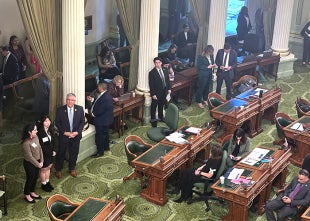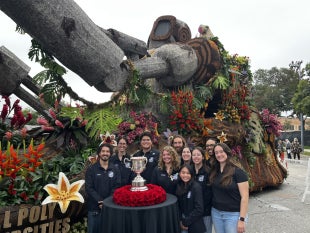Cal Poly Wins $700,000 Federal Grant to Study the Social Impacts of AI Kitchens and Robot Cooks
Contact: Patrick Lin
Director, Ethics + Emerging Sciences Group
palin@calpoly.edu
SAN LUIS OBISPO, Calif. — The Ethics + Emerging Sciences Group at Cal Poly has been awarded a grant of over $700,000 from the U.S. National Science Foundation (NSF) to study the social and ethical impacts of robot kitchens, which are already at work in some restaurants.
The four-year project will anticipate the effects of robot kitchens on society, kickstarting the first extensive conversation on the subject. Philosophy professor Patrick Lin, the principal investigator for the new project and director of the Ethics + Emerging Sciences Group, explains, “This project will help to draw out the hidden and very broad impacts of technology. By focusing on the trend of robot kitchens that’s just emerging from under the radar, there is still time for technical and policy interventions in order to maximize benefits and minimize harms and disruptions.”
Because food is so fundamental, automating kitchens can have far-reaching impacts, raising questions about whether the new technology will further homogenize food or diversify cooking techniques, and how it will affect communities, parent/child education and bonding in the kitchen, restaurant kitchen employees, gender roles and expectations, and religious food preparation requirements. Technology ethics issues such as economic displacement, social isolation, the pursuit of efficiency and convenience, artificial intelligence bias and errors, and cybersecurity all add further complexity.
The Cal Poly research team includes faculty researchers from the College of Liberal Arts as well as the College of Agriculture, Food and Environmental Sciences. They are: Patrick Lin and Ryan Jenkins (philosophy), Jennifer Jipson (psychology and child development), Anya Foxen (religious studies and women’s, gender and queer studies), and Shohreh Niku (food science and nutrition). The project is also supported by Susanne Gartner in the Grants Development Office and Stephany Martin in Sponsored Programs at the Cal Poly Corporation.
The interdisciplinary research team will map out and explore a full range of possible benefits and risks to individuals, family and communal relationships, creativity and culture, economics and society, health and well-being, and environment and safety. These discussions will guide the next decade or more of research, given the many rich dimensions of this interdisciplinary study. To ensure that the work is inclusive, it will be guided by three workshops in different geographies, accounting for any cultural or regional differences. Workshops will be held over the next three years in North America, Europe and Asia Pacific, as the first likely adopters of robot kitchens at scale, since those geographies are developing the technology.
“Robot or AI kitchens would automate a special place and communal activity in the home, so that immediately warrants critical attention,” Lin said. “Outside of the home, restaurants are one of the most essential and oldest businesses, given the primacy of food. They are the bedrock for an economy, the soul of a community, and the ambassador for a culture. But the pandemic is causing a seismic shift in the restaurant industry, and robot kitchens could be a tipping point that forces many restaurants to evolve or die in the coming years.”
About the Ethics + Emerging Sciences Group
Based at Cal Poly, the Ethics + Emerging Sciences Group is a non-partisan organization focused on emerging technology ethics, including risk, legal, policy, and social impacts of new technologies and sciences.
About Cal Poly
Cal Poly is a nationally ranked public university located in San Luis Obispo, California, and known for its Learn by Doing philosophy. Each year about 22,000 top-tier students come to Cal Poly to put knowledge into action, taking their learning outside the classroom as they prepare for careers in areas such as engineering, agriculture, science, business, humanities and the built environment. Cal Poly’s hands-on approach, small class sizes and close student-faculty mentorships result in graduates ready from Day One to impact their communities, California and the world.



